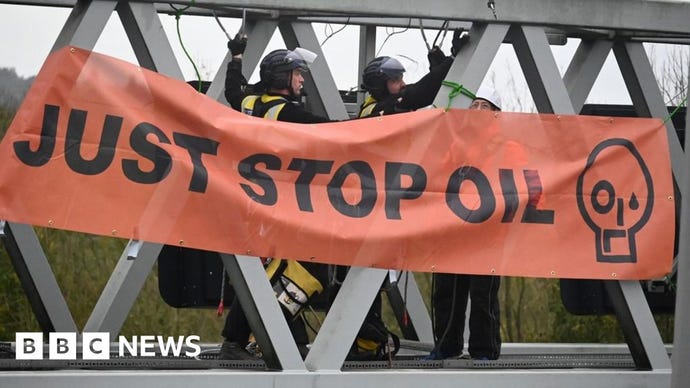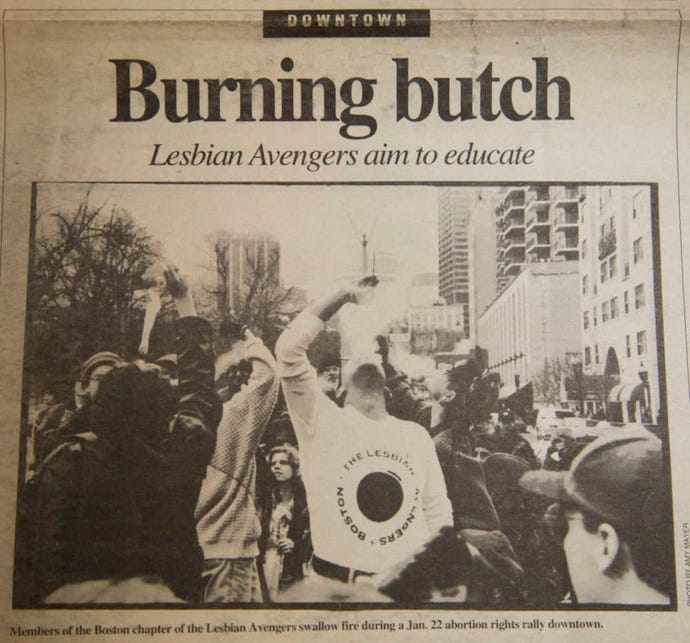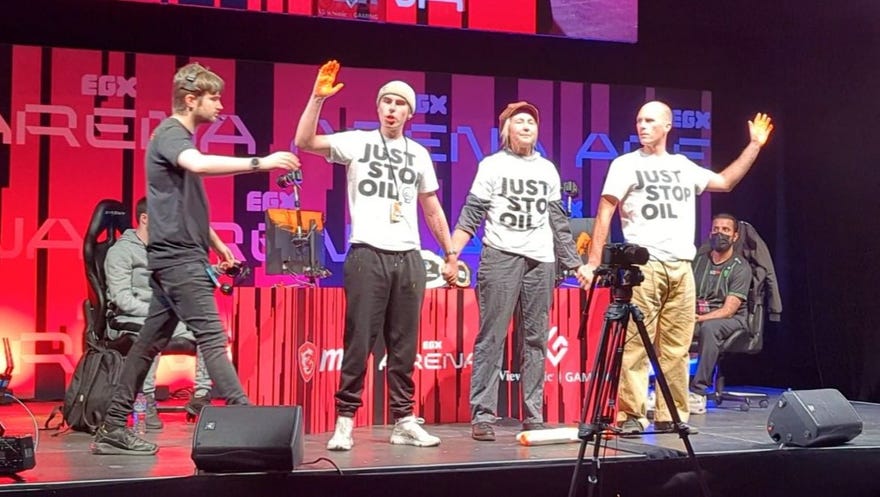An interview with Just Stop Oil about protest, playfulness and invading EGX
"A central part of the nonviolence training are these kind of roleplaying games."
At EGX earlier this month, climate change protestors cosplaying as the Ghostbusters interrupted a Tekken 7 tournament, spraying player screens with orange paint and attempting to make a speech before being hauled off by security. The three protestors, who were later arrested, are members of Just Stop Oil, a British activist group officially founded in February 2022 who carry out acts of nonviolent obstruction and vandalism in the hope of rallying support against the UK government granting new fossil fuel licenses and production agreements. In the case of EGX, which is run by Rock Paper Shotgun's parent company Reedpop, Just Stop Oil were protesting against the sponsorship of one EGX stage by Barclays Bank, who have financed billions of dollars of fossil fuel investments (Barclays have provided some official comment down the page). They were also trying to call attention to oil giant Shell's sponsorship deal with Fortnite, which includes a special themed map "powered by Shell V-Power(r) NiTRO+ Premium Gasoline".
I've written a bit here and there about the overlap between games, video games and protest movements. I've also been on a JSO protest march myself - albeit, slightly by accident (no, I didn't glue myself to anything). I was curious to hear more about the EGX protest, and specifically, whether the group's tactical use of cosplay for both dramatic effect and subterfuge represents any broader understanding of games as a form of protest art. JSO put me in touch with Oliver Clegg, a 20-year-old student who joined the group early on and has participated in some of their better-known direct actions. The below is a transcript of that conversation which has been edited down for length and clarity.
RPS: Can you tell me a little about yourself? How did you get involved with Just Stop Oil?
Oliver Clegg (OC): I became involved with Just Stop Oil in, I guess, December of 2021. Feels like a while ago now! When I started at university, I became involved with Extinction Rebellion, before Covid. But I suppose being under lockdown gave me more time to think, reflect, look these things up. And most of all, it showed that even when a government has the most scientific advice available, when it's trying to make the best possible decisions, it still manages to fuck things up.
And so my faith in the government to deal with the climate crisis just kind of evaporated. I mean, I'd been thinking, 'Oh, it's such a big crisis. It's so significant. All the scientists are talking about it, they're talking about in the UN - obviously, the government is taking this seriously, and doing things at a realistic pace.' And Covid taught me that oh no, even even when they have the best scientific advice, they still managed to arse things up.
So yeah, coming out of that, starting uni, I was thinking, I want to get involved in the climate movement, and that was initially through Extinction Rebellion. I was at a protest at COP 26 in Glasgow. And it was on one of those protests that I was told about this new Just Stop Oil thing starting. And at that point I just started thinking that I needed to step up from - I mean, it's powerful, going on protests, and it's important that everybody does. But I think at that point, I was fed up with just going along and holding a placard and standing in a town centre.
And I thought, if I'm not willing to be arrested for this, maybe that means I'm not taking it seriously enough. It is mine and everybody else's lives that are at stake here. And so I was involved in a lot of the protests that happened at oil terminals. That'll be in April 2022, where we were blocking the distribution of petrol from these terminals. And yeah, and that's when my Just Stop Oil experience started.
RPS: You've been much more engaged than I have! I joined a Just Stop Oil march back in 2022, and I kind of blundered into it at the last minute, and then I ended up at the front of the march, but that's just because somebody gave me a big banner. The number one rule at protests seems to be that if somebody asks you to hold one of the big banners, you've got to be careful, because you're probably going to end up at the front.
With regard to the EGX protests - in your statement you talk about EGX's connection to Barclays, which invests in fossil fuels, and about Shell using Fortnite to market itself to younger players. But still, why protest at a gaming event rather than going after Barclays directly? And why Tekken?
OC: There's the direct thing about EGX actually being sponsored by Barclays. But on top of that, we've done lots of protests of cultural events. I disrupted a football match - can't claim to be the world's greatest football fan, but the purpose of it wasn't punish the fans or anything, or to disrupt for the sake of disrupting. The point is that these kinds of protests are the ones that get visibility. And the number one priority has to be the government seeing that people aren't satisfied with it licencing more fossil fuel projects.
RPS: I get the impression that with Just Stop Oil protests, like the football match you disrupted, people often see it as aimed at them, whereas you're actually trying to reach the policymakers.
OC: Well, they would - I mean, if it's a thing that you love and it's been disrupted, then you'll be annoyed about that. But obviously, we're always trying to make the wider point that it's kind of coming from within those communities. It was mostly gamers that targeted EGX for that protest. I did a protest where we blocked the Coca Cola float at Pride, and everybody doing that was queer. It's not a kind of outside attack on queer people, or on football fans, or on gamers. It's people from within those communities, saying 'It's not on, something needs to be done about the climate crisis, about fossil fuel licensing'.
RPS: Have you ever thought about doing any kind of protest action within games like Fortnite?
OC: That's an interesting thought. I personally haven't - I'm sure other people at Just Stop Oil have. When we were talking about this interview, mention was made of protest games, and it's an interesting thing to think about. But I struggle to imagine that that would be particularly effective, given that all I guess it could be is a lot of people symbolically showing that they care, in the same way as signing a petition.
One of the things that's really powerful about Just Stop Oil protests is that, as was the case with the EGX one, they were all arrested doing that. People put themselves on the line for it. And today [October 19th 2023], there was a protest that was blocking a coach taking migrants to the Bibby Stockholm barge, and they were getting aggression from the coach driver, and getting rammed by the coach. And so one of the things that makes it powerful is that it's not a sign, or a petition or something that has that really low level of sacrifice. It's saying I'm willing to be arrested or to be rammed by a coach, these are risks that I'm willing to take, because the risk of climate breakdown is so much greater.
RPS: Obviously, the stakes are much, much lower in a virtual environment. But equally, I think there's an opportunity there - if you're thinking about blocking the means of production, there are equivalents for that in games, in terms of how you can just gang up and stop them functioning. And when it's a big game like Fortnite, if you go into a match, and set up a protest that appears on the right streams, because you have streamers playing those games who might have hundreds of thousands of subscribers, there's an opportunity to spread the message further. Though as you say, at the end of the day, not much is risked. But maybe there's room in your work for that more mundane kind of subversion.
OC: I suppose there always is, and something that's sometimes talked about is the 'radical flank' effect, where, for example, when Just Stop Oil supporters climbed onto gantries on the M25. There was polling immediately before that, and immediately after that, in which it was asked how many people were willing to support Friends Of The Earth, that much more moderate NGO sort of climate campaign, and the number of people who said they'd support it before and after those protests on the gantry went up by more than 100,000.

And the thinking would be that if people see a protest they perceived as radical or has that kind of higher degree of sacrifice to it, then people might not necessarily support that, but it does make them think, 'Well, I guess I should be doing something, playing my part'. And if that means that people are pushed from being sort of passive and disempowered into taking small steps, then actually it can be the case that these sorts of protests, even though they're seen as offputting, actually lead to the public having much, much greater support for climate action.
RPS: I can see that, for sure. How much does Just Stop Oil gather data about how much change is taking place? Are you able to join the dots between particular protests and, say, government policy?
OC: There's certainly been been polling, and there have been reports commissioned. And the amount of media that's generated about Just Stop Oil gets tracked and monitored. In a lot of cases, you can see really immediate sort of visible [reactions] when a protest happens, you'll get a response from the organisers of the event that's been targeted, or from politicians talking about it.
RPS: Have you been tracking how gamers reacted to the EGX protest?
OC: I personally haven't, but I'm sure somebody has!
RPS: Another thing I'm interested in is whether you think about being playful as a way of protesting. At EGX, for instance, the protestors cosplayed as the Ghostbusters, which on the one hand presumably allows you to hide the fact that you've got Super Soakers full of orange paint. But on the other hand, it's just kind of fun! I'm probably pushing it too far, but I'm interested in whether you think about protest itself as having game-like qualities, or about playfulness in general as a rebellious activity.
OC: It's interesting, and it's true. Similarly, the protests at Pride - we all dressed absolutely outrageously, which in part sort of blended in because of the nature of the parade, but it also made for wonderful visuals. And when you look at past social movements, thinking about how we can learn from ones that have been successful? Oftentimes, they've been really kind of zany protests! I think looking too kind of austere and serious can be off-putting.
For example, in response to Section 28, which was banning the discussion of homosexuality in schools, there was a group called the Lesbian Avengers, and their protest involved like fire breathing. And they actually abseiled down from the public viewing gallery in Parliament to the floor of the House of Commons. And obviously, Section 28 was repealed and I think partially because of the awareness brought to it by those kinds of protests.

There's a value to things being serious and austere, especially when the situation is so serious, but it can certainly capture attention and be more inviting of participation when there's an element of fun to it. Some of the most memorable protests that Just Stop Oil has done, like soup being thrown at the Van Gogh, or when Louis McKechnie tied himself onto the goalposts - that lives on in thousands of ways because it just looks so weird.
RPS: It's interesting, because my impression of Just Stop Oil protests is that there's a balance of absurdity and seriousness. Like Louis, who tied himself to the goalposts - he played it very straight, but obviously what he's doing is fundamentally silly. I'm sure this sounds like a very frivolous thing to focus on - I'm just thinking about the staging of it.
OC: Yeah, I mean the world is absurd and ridiculous. There's something funny about about all of the world's governments knowing that continuing to licence fossil fuels is causing climate breakdown, that it is, in the end, going to kill their own citizens. And them saying, 'Oh, you know what? Let's license more'. In the case of [UK prime minister] Rishi Sunak, saying that he's going to max out fossil fuel reserves, that's absurd. That's ridiculous, and maybe a more kind of absurd protest can point that out.
RPS: On the marches I've been on, I've always been struck by the fact that the playfulness thing can be a way of organising and motivating people. Like, the classic one for me is there's always that musical game on a march, where you're singing along to a walking band, and there's a kind of call-and-response element to it. And it makes me wonder whether you use games or playful activities internally or on your protests to motivate or rally people?
OC: I suppose so. The playful elements, the call and response chants are powerful for sort of holding people together as a community. And actually, did you go to any nonviolent direct action training for the Just Stop Oil march you went on?
RPS: I think I should have! We were at the front of the march, and there was the whole question as to whether we'd go onto London Bridge, and the police had said, 'If you come on here, you're all getting arrested'. And the organisers were deciding whether or not to go for it, because we were going to join up with another march coming the other way. I think we were told that if we were going to do that, we should have had that training, and I just managed to miss it.
OC: The value of the training is making sure that even when there's aggression, people yelling at you, you don't yell back. You don't do things that can escalate your situation. You can keep the nonviolence, which is really at the core of what Just Stop Oil protests are about. But the reason I think of it in relation to games is that a central part of the nonviolence training are these kind of roleplaying games, where you're taking turns to be the protestor getting yelled at by a member of the public, and to be the member of the public doing the yelling, which in a way is an exercise in empathy. It feels like a sort of drama game.
RPS: Yeah, I can really see that. I can see how having a persona to play simplifies your interactions a bit. And obviously, it can do that in a bad way. You can have a persona that makes you more likely to be violent. But roleplaying as a character that has certain set behaviours means that there's less ambiguity when you're in a high pressure situation, whether it be with members of the public or with the police.
OC: Yeah, yeah. It's very important even if you're thinking, why are these police arresting ordinary members of the public, who are standing up for something important. Or if you're thinking that the Met police are institutionally racist and sexist and homophobic, you don't let that cloud the way you interact with them. And that sort of allows things to be smooth and crucially, to be nonviolent. Because on a practical and on a philosophical level, what Just Stop Oil is about is preventing the violence of the climate crisis and not using violence in any way ourselves.
RPS: Last question - I'm interested to know if you've looked at how people have used specific popular games in other regions as a pretext for organising, or as a kind of prop. In particular I'm thinking of rallies in Hong Kong in 2019, where democracy protesters were using Pokemon Go as an excuse to meet and convene, to avoid getting ambushed by plainclothes policemen or whatever. Because they were all just meeting up to play this mobile AR game - 'we're out here gathering Pikachus, and we're all protesters by the way, but keep that bit quiet'. Have you come across anything like that in your research into the older protest movements you've mentioned?
OC: I haven't heard that before, about the Hong Kong protests with Pokemon Go. This is a lot more old school, but I remember just before a march in London, there were a group of us waiting in a park next to Paddington Station, and some cops, I guess, knew we were going to be there in advance. And they were stopping and searching people. And this guy, this vicar was one of the protesters. There was a huge outdoor chess set in the park. He started playing chess with the cops. It was quite a sight.
RPS: Who won?
OC: The protestor!









